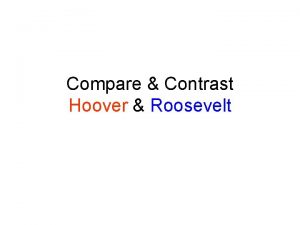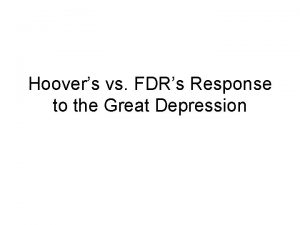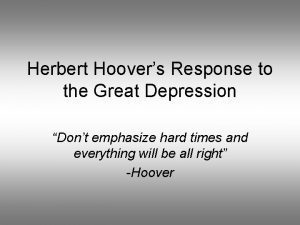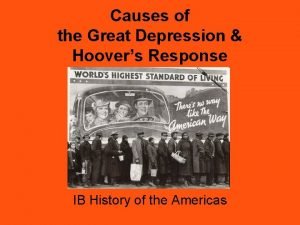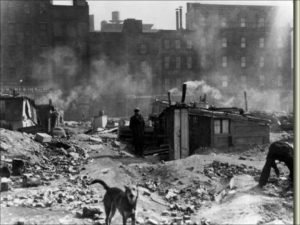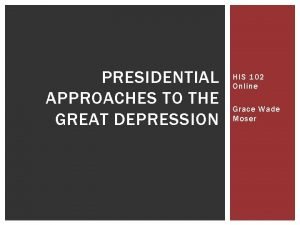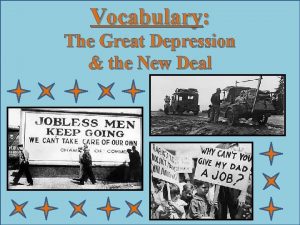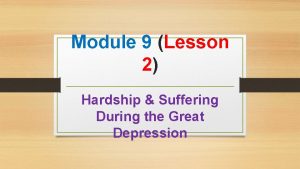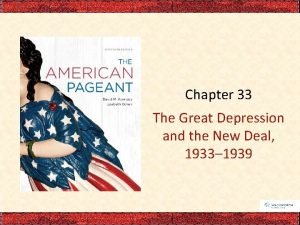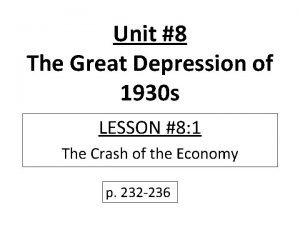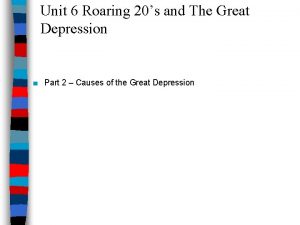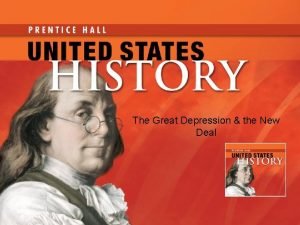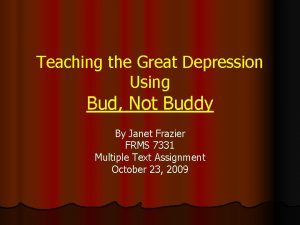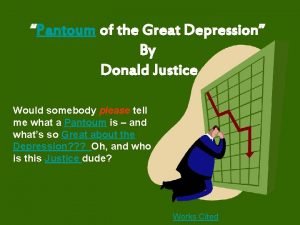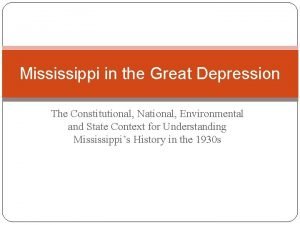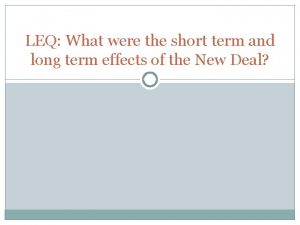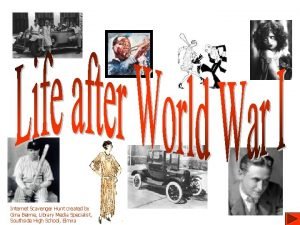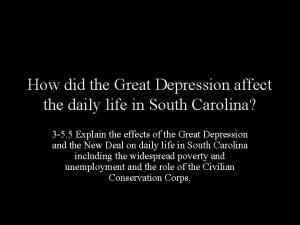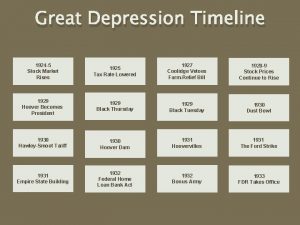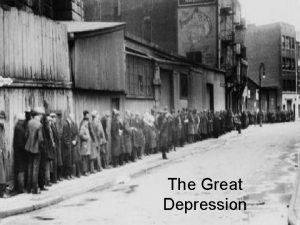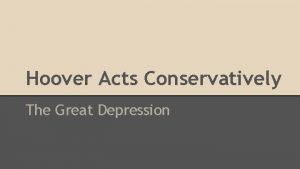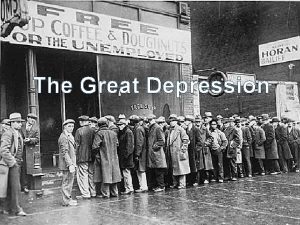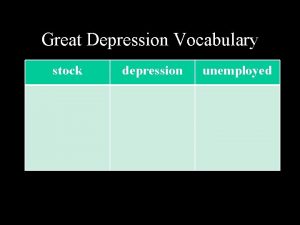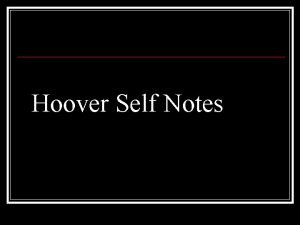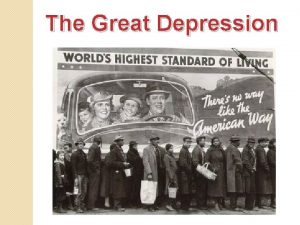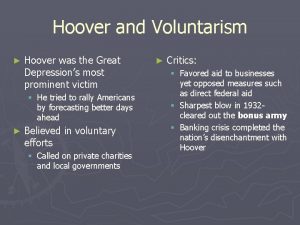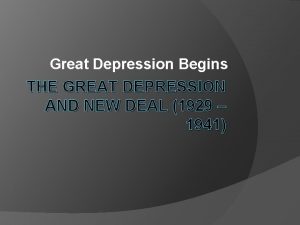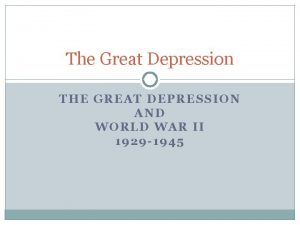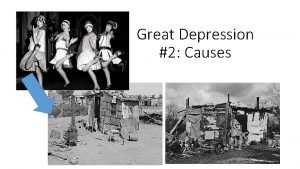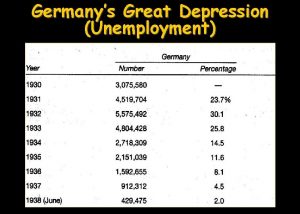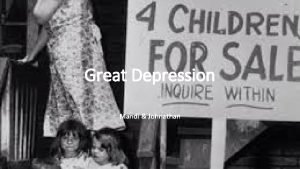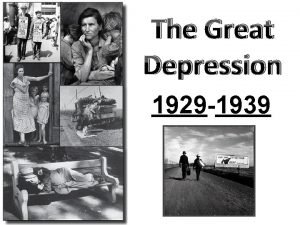Hoover and the Great Depression Was Hoover successful































- Slides: 31

Hoover and the Great Depression Was Hoover successful in addressing our nation’s problems?

Stock Prices Sep. 3, 1929 Nov. 13, 1929 1932 Low American Telephone 304 197 1/4 70 1/4 General Electric 396 1/4 168 1/2 34 General Motors 72 3/4 36 7 5/8 New York Central 256 3/8 160 8 3/4 Radio 101 26 2 1/2 U. S. Steel 261 150 21 1/4

Index of Stock Prices 1926 176 1927 245 1928 331 1929 210 1932 30

Unemployment as Percentage of the Labor Force 1900 5 percent 1910 5. 9 percent 1920 4 percent 1925 4 percent 1929 3. 2 percent 1930 8. 7 percent 1932 23. 6 percent 1933 24. 9 percent 1934 21. 7 percent 1935 20. 1 percent 1936 16. 9 percent 1937 14. 3 percent 1938 19 percent 1939 17. 2 percent 1940 14. 6 percent 1950 5 percent

Bank Failures 1929 659 1930 1, 352 1931 1, 456 1932 2, 294 1933 5, 190 Creation of Federal Regulatory Agencies Before 1900 5 1900 -09 1 1910 -19 4 1920 -29 2 1930 -39 11 1940 -49 2 1950 -59 2 1960 -69 6 1970 -79 20

Life During the Depression n n Rising unemployment (25%, 13 mil), bank & business failures Bread lines, soup kitchens Decline in birth rate Psychological impact – people blamed themselves Typical middle-class family: 1 -2 kids, rented house/apt. n Income dropped 40% n More women in workplace; but they were first fired Childhood anxiety; school enrollment increased n Prejudice and Discrimination n Mexicans and Mexican-Americans; Scottsboro Boys case n Leisure: board games (Monopoly), pinball, cycling, escapist novels (The Good Earth, Gone w/ Wind) n Radio and Film: soap operas, “Lone Ranger, ” War of the Worlds; movie attendance up (Marx Bros, etc. ) n Dust Bowl – overfarming, overgrazing, wind, drought n Mass internal migration – Okies & Arkies, Grapes of Wrath n

Herbert Hoover, 1932 The proposals of our opponents will endanger or destroy our system. . I especially emphasize that promise to promote "employment for all surplus labor at all times. " At first I could not believe that anyone would be so cruel as to hold out a hope so absolutely impossible of realization to these 10, 000 who are unemployed. . If it were possible to give this employment to 10, 000 people by the government, it would cost upwards of $9, 000, 000 a year. . It would pull down the employment of those who are still at work by the high taxes and the demoralization of credit upon which their employment is dependent. . It would mean the growth of a fearful bureaucracy which, once established, could never be dislodged.

Hoover’s Response to the Depression n n n Committed to relying on voluntary efforts n Capitalism will spur recovery n “trickle-down” economics n too much government involvement would undermine freedom Rallied business leaders to help—but they backed down Cut taxes in 1930; then raised them in 1932 Public Works (Boulder/Hoover Dam) Federal Farm Board (failed) Hawley-Smoot Tariff n Choked world trade

Hoover’s Response to the Depression n Reconstruction Finance Corporation – loaned $$ to banks and corporations Emergency Relief and Construction Act – provided states w/ some money to aid the poor Norris-La Guardia Anti-Injunction Act n Outlawed yellow-dog contracts; prevented federal courts from restraining strikes & boycotts

Hoovervilles


Bonus Army Marches on Washington



Discontent with Hoover n Hoovervilles, Hoover Blankets n n Many blamed Hoover for the Depression Bonus Army § WWI vets wanted their bonuses § They assemble the “Bonus Expeditionary Force” in Washington , DC § Hoover disperses them w/ army


AIM: Was FDR’s approach to the Great Depression more effective than Hoover’s?


I. 1932 Election n Franklin Delano Roosevelt n n n Pledges more government involvement to solve society’s woes Wins by landslide Broad coalition brings him victory – immigrants, Jews and Catholics, farmers and industrialists, city dwellers and rural poor

FDR, 1932 We have two problems: first, to meet the immediate distress; second, to build up on a basis of permanent employment. As to "immediate relief, " the first principle is that this nation. . . owes a positive duty that no citizen shall be permitted to starve. . In addition to providing emergency relief, the Federal Government should and must provide temporary work wherever that is possible. You and I know that in the national forests, on flood prevention, and on the development of waterway projects. . tens of thousands, and even hundreds of thousands of our unemployed citizens can be given at least temporary employment. . Finally. . . we call for a coordinated system of employment exchanges, the advance planning of public works, and unemployment reserves.

Two Philosophies of Economic Policy Hoover: “Economic depression cannot be cured by legislative action or executive pronouncement. Economic wounds must be haled by the action of the cells of the economic body – the producers and consumers themselves. ” FDR: “In times of economic depression, it is the responsibility of government to create programs that would provide jobs to the unemployed. The revenues that would be generated will repay the government expenditures. ”

n 1929 -1933 n 1933 -1945 n Republican n Governor of NY n Pro-Business n Democrat n Supply-side/trickle down n Gov’t must help economics n Rugged Individualism n Laissez Faire doesn’t work n Pump-priming (gov’t programs) n John Maynard Keynes – deficit spending

II. Strategies of the New Deal n Brain Trust: group of lawyers and professors who advised FDR on economic policy n Trial and error: do something and see if it works n Pump priming economic approach, not trickle down n Increase power of the federal government (especially the executive branch) and gov’t spending.

III. First Hundred Days n 15 major pieces of legislation, including Emergency Banking Act, FDIC, Home Loan Act, Farm Loan Act, public works programs, Industrial Recovery Act, etc. n Bank holiday (Emergency Banking Act) – meant to restore public confidence in banks and assess the banking structure

First 100 Days

Fireside Chats 1. “FIRESIDE CHATS” TO EXPLAIN HIS PROGRAMS TO THE AMERICAN PEOPLE

IV. Relief (providing immediate help to those in need) n Bank Holiday n Emergency Banking Relief Act n Federal Emergency Relief Administration (FERA) – gave money to states and local governments n Civilian Conservation Corps (CCC) – provided young men with temporary employment on environmental projects. n PWA/CWA – public works programs – bridges, highways, schools, airports, etc. n Works Progress Administration (WPA): Largest work relief program in history, included jobs for artists and writers


V. Recovery (rebuild certain parts of the economy) n National Industrial Recovery Act n n (NRA)– regulated business competition, wages, prices, hours Agricultural Adjustment Act (AAA) – controlled supply and demand of crops Resettlement Administration – aided farmers Homeowner’s Refinancing Act Tennessee Valley Authority (TVA) – regional development, provided jobs, electricity, flood control

VI. Reform (permanent, long-term changes designed to prevent another depression) n Securities and Exchange Commission (SEC) – n n n oversees the stock market FDIC – insures deposits in banks National Housing Act (FHA) – insured loans for home building and buying Social Security – Safety net for elderly, disabled, dependents. National Labor Relations Act (Wagner Act) – legalized unions and collective bargaining Fair Labor Standards Act – minimum wage, minimum age, maximum hours

VII. Impact of the New Deal n “The significance of the New Deal is its permanence. ” n In what way?
 Hoover and fdr compare and contrast
Hoover and fdr compare and contrast Hoover v. fdr: responses to the great depression
Hoover v. fdr: responses to the great depression Hoover's response to the depression
Hoover's response to the depression What was hoover's response to the great depression
What was hoover's response to the great depression What was hoover’s response to the depression?
What was hoover’s response to the depression? Hoover's poor farm tobacco fund
Hoover's poor farm tobacco fund Hoover struggles with depression
Hoover struggles with depression The great depression vocabulary
The great depression vocabulary Module 9 lesson 2
Module 9 lesson 2 Pros and cons of the great depression
Pros and cons of the great depression What is the main idea of this cartoon?
What is the main idea of this cartoon? Chapter 33 the great depression and the new deal
Chapter 33 the great depression and the new deal Having a strong wish to be successful
Having a strong wish to be successful Longing, strong desire
Longing, strong desire Rarig great depression
Rarig great depression Great depression
Great depression Tennessee valley authority
Tennessee valley authority Foreclosure great depression
Foreclosure great depression Five effects of the great depression
Five effects of the great depression Five effects of the great depression
Five effects of the great depression How did the great depression impact the world
How did the great depression impact the world Great depression ap world history definition
Great depression ap world history definition Bud not buddy great depression
Bud not buddy great depression Donald justice pantoum of the great depression
Donald justice pantoum of the great depression The great depression summary
The great depression summary What is deflation
What is deflation Okies great depression
Okies great depression The great depression leq
The great depression leq Five effects of the great depression
Five effects of the great depression How did the great depression affect daily life
How did the great depression affect daily life Timeline of the great depression
Timeline of the great depression Great depression causes
Great depression causes
